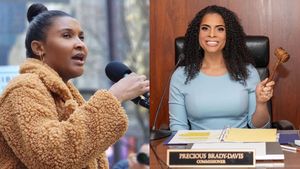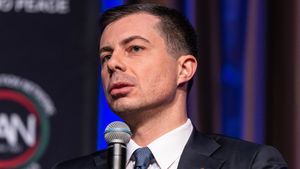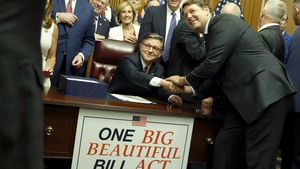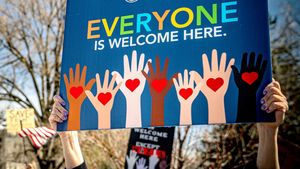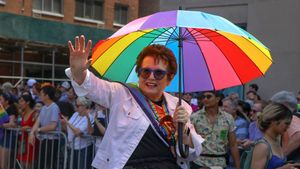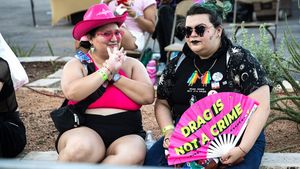Here's what Garrard Conley had to surrender the morning he arrived at the Love In Action (LIA) facility in Memphis, Tennessee: his phone, his wallet, his driver's license, and a Moleskine journal, in which he wrote his short stories. The blond boy who confiscated it yanked a bunch of pages free from the binding. "And he said, in a voice free of emotion, 'False Image,'" recalls Conley in Boy Erased, his elegant memoir about the year in which his Southern Baptist upbringing collided with his sexual awakening as a gay man. "False Image," a key tenet of LIA, referred to anything and everything suggestive of a resident's homosexuality. Detecting and destroying FIs was part of how you got the gay out. "The concept is stolen from Alcoholics Anonymous, except AA doesn't have you stay in a place all day, monitored," says Conley.
 Courtesy Of Garrard Conley
Courtesy Of Garrard Conley
Conley was 19 when he entered LIA for a two-week evaluation. That was in 2004, the year -- his mother likes to joke -- in which they were abducted by aliens, a metaphor for the hallucinatory nature of the family crisis that began when Conley's father gave him an ultimatum: "You'll never step foot in this house again if you act on your feelings. You'll never finish your education." It's a mark of how far Conley has traveled that at the time his response was, "Fair enough."
There was nothing fair about it, of course. But, if your father was a Billy Graham-loving Southern Baptist minister, and you'd been raised to believe that Hell was real, and if you'd grown up in a world in which pastors preach that evolution is a satanic lie, perhaps you, too, would find it easy to consider same-sex attraction a sickness that needed curing. "That whole environment was just permeated with what my parents believed was a literal interpretation of the Bible," Conley says when we meet at a cafe in New York, where he now lives. "It's hard for me to reconstruct because it was so familiar to me for so long and now it feels so distant."

Torture is a strong word, but if and when we get a museum that honors the centuries of suffering inflicted on queer people, a whole wing will need to be dedicated to that unique form of persecution known as conversion, or reparative, therapy, by which those acting under the banner of faith have sought to turn one sexual instinct into another. Conley's story is far from unique, and far from the worst. In the U.S., research suggests that 700,000 adults have undergone such "treatment," around half of them as teenagers. The methods are cruel and frequently violent, from applying electrical shocks to men while they are forced to watch gay porn, to mind-control games aimed at persuading "patients" that their desires are rooted in dysfunctional or "disempowering" relationships with their mothers.
At LIA, the message was unequivocal: Homosexuality meant unhappiness, isolation, and death. Conley recounts a story in which a "defector" of 19 or 20 was forced to submit to a mock funeral, as other members read out his obituary, describing his slow decline into HIV and then AIDS. Stories like these were not uncommon at Love In Action, renamed Restoration Path in 2012 and widely considered the first modern "ex-gay" ministry predicated on changing the sexual orientations of gay men and women. Among the earliest to raise the alarm about its methods was founding member John Evans, who left in 1975 after a friend, distraught by his failure to "convert," committed suicide. "They're destroying people's lives," he told The Wall Street Journal in the 1990s. "If you don't do their thing, you're not of God, you'll go to Hell. They're living in a fantasy world."
 Courtesy Of Focus Features
Courtesy Of Focus Features
When Conley handed over his notebook that day, it was part of a series of rules and prohibitions designed to maximize LIA's control over patients during their treatment, and beyond. Other rules included restrictions on where residents could travel within Memphis, ways of dressing and grooming (no "muscle shirts," no sideburns "below the top of the ear"), and how denizens engaged with the secular world (no listening to Beethoven or Bach, or entering "non-Christian bookstores," for example). Women were forbidden to wear "mannish/boyish" clothes, whatever that might mean, and men had to avoid "campy" behavior. Conley later gave his LIA handbook to the law firm of McDermott, Will & Emery, which works with The Mattachine Society of Washington, D.C., to archive LGBTQ history. "They took my book and analyzed it to see whether it matched what they knew about cults, and it did," says Conley. "Of course, I knew it operated as a cult, on some level, but it was still a shock. LIA felt like everything I'd ever encountered in my youth, only more distilled and written down."
Today, Conley seems relaxed and loose, attuned to himself and his place in the world, with quick, amused eyes. But it took effort for him to get to this point. "Every time I've read a book or ingested a new historical fact that my Baptist upbringing taught me to reject, I've had to fight against the sneaking suspicion that I am being led astray by Satan," he writes in the epilogue to Boy Erased.
 Courtesy Of Focus Features
Courtesy Of Focus Features
Like other gay teens, Conley went through the motions of having a girlfriend as a way to "cure" himself, but he was also a voracious reader who found in novels a counterweight to the Bible, one that helped expand the horizons of his world. "I always say literature saved my life -- it's the one dogmatic thing I can say," he says. "It sounds silly now, but I believed that these writers were speaking to me." He recalls the experience of reading Nathaniel Hawthorne's The Scarlet Letter in college like "an electric current flowing through me," and he became convinced that the novelist was creating a metaphor for LGBTQ people in the character of Hester Prynne -- forced to wear her scarlet "A" for the crime of adultery.
At a small liberal arts college in Arkansas, freed from small-town bigotries, Conley found himself caught between the tug of his upbringing, on the one hand, and his new freedoms on the other. He withdrew from church, donned a Radiohead T-shirt, read Dostoyevsky and Gertrude Stein, and defended evolution in conversations with a fellow student, David, while fantasizing about how their bodies might feel curled into one another. But this fantasy never panned out. Instead, after taking Conley to a service at his Pentecostal church, David raped Conley in his dorm room later that day. "I'd been unable to move from the bed where he had placed me afterward -- I believed that God was punishing me physically for my mental transgressions," writes Conley. A few weeks later, David called Conley's mother and outed her son. "David had trumped me. The knowledge of my homosexuality would seem more shocking than the knowledge of my rape; or, worse, it would seem as though one act had inevitably followed the other, as though I'd had it coming to me."
Conley is gentle on his parents, and generally reluctant to judge anyone involved. "I question whether or not I do it out of stubbornness or actual compassion," he says. "Given my experiences, I'm very resistant to having people tell me what I should believe, and so I don't like easy routes out." For this reason, he finds liberal handwringing almost as obnoxious as conservative pieties. "I've met many nice liberal audiences that have had no experience with those smaller places, and who are completely incredulous -- they're very well-meaning, but it's maddening, too, because this is a lot of the country," he says. "It shouldn't come as a shock. Look at who we elected. Mike Pence donated money to conversion therapy."

In many ways, Conley's parents are Southern cliches. His father was a quarterback in high school, his mother a cheerleader. Both are deeply religious, and they married young. But Conley is too thoughtful a writer to let such cliches escape scrutiny. In Boy Erased, he gives his parents their histories. He lets us know that his father grew up watching his own father tie his mother to a chair in order to beat her. He shows his mother's capacity for humor. In Memphis one evening, suffocating under the rigid constraints imposed by LIA, she essentially jailbreaks her son by leaving the "approved" Hampton's Inn they are staying at during his two-week evaluation for dinner at a fancy hotel in an off-limits section of the city. There she jokes about an idea for a TV series, Preachers' Wives Gone Wild, while he surreptitiously observes their handsome waiter. Somewhere in LIA HQ the False Image alarm bells must have been going crazy.
Among the ironies of conversion therapies like LIA and Restoration Path is the fact that they are run and managed largely by gay men who have been through the program themselves, renounced their past, and now seek to encourage others to do the same. Conley characterizes them by their "ex-gay smiles" in which the corners of their lips "stretched beyond the limits of normalcy."
One such man was John Smid, former executive director of LIA. Smid is a gay man and a Christian who has admitted, since his time at LIA, that he's "never met a man who experienced a change from homosexual to heterosexual." Today, Smid lives in Paris, Texas, in a same-sex marriage. But when Conley met him, in 2004, he was a diehard proselytizer for conversion. It was his idea to expand LIA's mission from adults to teenagers. Although compassionate towards well-meaning parents who sent their children to places like LIA, Conley struggles to find such generosity for Smid. "We became close many years later, and I was able to understand his story, but I feel he should spend every day of his life raising awareness for what he did, and apologizing to families he affected," he says. "My family never got that apology."
Conley believes his father has come to accept his homosexuality, but the wounds are not entirely healed. "Everyone's feelings are just very hurt," he admits. "My dad feels that I don't understand the pressure he has from all of this. The community has disinvited him from certain revivals because my name comes up. He's lost members who just walked out. Meanwhile, my mom's stuck in this in-between, between a very fundamentalist preacher husband and a left-leaning queer son -- and that's not a good place to be in." He compares his father's beliefs to a game of Jenga. "All his tenets are at the bottom, and it feels very solid. But if you move one block everything becomes unbalanced. And the one he can't move, that would bring it all down, is homosexuality, because it's all tied in to the literal interpretation of the Bible." He understands why liberal Americans make fun of places like his home city of Mountain Home, a small Arkansas town in the Ozarks. ("There are a lot of bigots in my hometown," he says.) But he also finds the stereotypes about working-class America -- from either direction -- silly and unhelpful. Did his parents vote for Trump? "Let's just say they voted differently," he answers.
Meanwhile, the man who was saved by books now gets weekly affidavits of the impact his own book, published in 2016, is making. "This kid sent me this beautiful letter about how he found my book in his local library and couldn't bring it home because his parents would see it, so he would read it in small increments until he finished it," he says. "It was one of the most beautifully written letters I've read. He said, 'I think I'm going to get through this, but it's just really hard and I don't know how to.' It made me sob, so I sent it to my publicist, and she sent it to my editor, and they decided to send him all these books with a note to say they had been won in a sweepstakes. Every book had a gay character in it, but it wasn't obvious -- you couldn't tell from the blurbs."
Boy Erased has been adapted into a film, due for release in November. Directed by Joel Edgerton, it stars Russell Crowe as Conley's father, Nicole Kidman as his mother, and Lucas Hedges as Conley himself. Early last autumn, as filming commenced, a producer called Conley to ask if he knew where Russell Crowe was. "How the fuck would I know where Russell Crowe is," he replied. "Isn't he on set?" He wasn't, as it turned out. Instead, Crowe had taken a private plane to Mountain Home to attend a Baptist service led by Conley's father. "My dad called up two hours later, and he said, 'Well, you'll never guess what just happened,' and I said, 'Did Russell Crowe just show up at your church?'" Conley laughs uncomfortably at the memory. "It made a little bit of a scene -- it's a very small town," he says. "Russell Crowe just comes in with his entourage and sits down. I was told my dad paused in his sermon for about two minutes before continuing."
Crowe went to great lengths to study Conley's father, even coming away from Mountain Home with his lapel pin, a wooden cross from the Galilee, which he wore throughout filming. He also sent a case of watches to Conley, asking him to select the one his dad might wear. "Of course, I didn't know," says Conley with a laugh. "I just knew my dad didn't ever want anything skinny because it made him feel too effeminate, so I chose one of those big watch bands."
Conley, now happily married to his husband since February 2017, has recently finished his first novel, set in the early 19th century during the Second Great Awakening, when America was galvanized by a wave of religious revival meetings. It's been a relief, he says, not to be writing about himself anymore. "I've reached the limit," he says. "I've been talking about this nonstop. I care about the issue, but I've just got to take a break. It's like re-traumatizing yourself every time."
It's been 14 years since Conley checked himself out of LIA and called his mother to take him home. "I didn't have to leave my parents behind," he says. He counts himself among the lucky ones.
Photography by Eric Mcnatt




 Courtesy Of Garrard Conley
Courtesy Of Garrard Conley
 Courtesy Of Focus Features
Courtesy Of Focus Features Courtesy Of Focus Features
Courtesy Of Focus Features


































